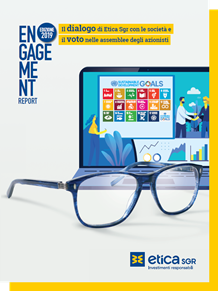Engagement is a critical part of understanding and practising responsible investment. The aim of this activity is to lead companies towards more sustainable behaviour, encouraging them to make decisions that also take into account environmental, social and good governance (ESG) issues in their corporate policies.
These types of choices can also bring financial benefits, in terms of both performance and the risk-return profile of an equity portfolio.
Dialogue with companies and results achieved

Our engagement activity develops over the long term, through dialogue with companies over the entire year and participation in the shareholders’ meetings of companies in which the funds invest in order to exercise voting rights related to participation in the share capital.
Let’s look at the results of the engagement activity that we took forward with companies in 2018:
125
International companies with which we engaged in dialogue
526
Questions put on ESG issues
157
Votes on agenda items in shareholders’ meetings
In 2018, we engaged in dialogue with 125 international companies, putting more than 500 questions to management on issues of social and environmental responsibility and company policies. Dialogue was taken forward by means of written requests for information and organising conference calls, meetings and workshops with businesses.
We also took part in the shareholders’ meetings of 21 companies, voting on more than 150 agenda items. Voting in shareholders’ meetings, i.e. shareholder activism, took place through our direct participation in the shareholders’ meetings, in the case of Italian companies, and through electronic platforms for foreign firms.
Would you like know all about our dialogue with companies?
Download our Engagement Report:
Strategic areas of engagement:
 |
|
 |
|
 |
|
Engagement and the association with the Sustainable Development Goals
For the second consecutive year, we chose to associate the issues discussed during dialogue with companies with the United Nations Sustainable Development Goals (SDGs), the action programme subscribed to by the governments of the 193 member countries of the United Nations to promote sustainable economic, social and environmental development, and cover a number of specific areas.
- SDG 2 - Zero hunger
- SDG 3 - Good health and well-being
- SDG 8 - Decent work and economic growth
- SDG 10 - Reduced inequalities + SDG 16 - Peace, justice and strong institutions
- SDG 13 - Climate action
- SDG 15 - Life on land
- SDG 16 - Peace, justice and strong institutions
SDG 2 - Zero hunger
![]()
Food security, in particular the reduction of pesticides and antibiotics in the agri-food industry
To achieve this goal, we concentrated on the issue of food security, and specifically on access to and education on food, transparent labelling and aspects relating to the use of pesticides and antibiotics in the agri-food industry. We have begun a dialogue on this subject with consumer discretionary companies, particularly restaurant chains.
SDG 3 - Good health and well-being
![]()
Access to medicine, with a particular focus on medicine prices
Access to medicine and medicine prices directly involve pharmaceutical companies. In this context, we asked for the adoption of strategies when setting drug prices that take into account the public’s concerns about the level or rate of increase in the price of prescription-only drugs, in order to avoid increases that are excessive and unsustainable for users.
SDG 8 - Decent work and economic growth
Protecting human rights along the supply chain and ensuring good governance
The independence of the board of directors, gender diversity at all levels, particularly senior management, and fair pay systems are important issues. We therefore encourage companies to verify that their suppliers also comply with the values of social and environmental responsibility, to avoid incidents of discrimination or exploitation such as child labour or forced labour.
SDG 10 - Reduced inequalities + SDG 16 - Peace, justice and strong institutions
Tax responsibility
We engaged in dialogue on this issue, particularly with companies in the health care and ICT sectors, which are deemed to be most at risk of developing aggressive tax policies owing to their involvement with intellectual property rights. The aim is to improve disclosure on taxes paid and to encourage the development of responsible strategies in this area.
SDG 13 - Climate action
Management of risks relating to climate change
In this context, we continued and strengthened our commitments in the environmental field, undertaking dialogue initiatives with companies aimed at strengthening reporting on positive impacts in terms of emissions reduction and energy efficiency, and, in general, on their actions to manage the risks associated with climate change. In addition to dialogue activity, we also took part in international campaigns with a specific focus on environmental aspects.
SDG 15 - Life on land
Prevention of deforestation
We have called on the companies with which we are engaged in dialogue to adopt strict due diligence in monitoring their supply chains for raw materials such as timber and palm oil. We also take part in international campaigns to confirm the importance of responsible procurement policy.
SDG 16 - Peace, justice and strong institutions
Protection of privacy
Protection of privacy and sensitive data, and cyber attacks in general, are also core issues for investors. The latest report of the World Economic Forum identifies information security as one of the top five global risks. We asked operators in the communication services sector to provide detailed information on the oversight of such risks, particularly in relation to protecting minors from possible abuse.






